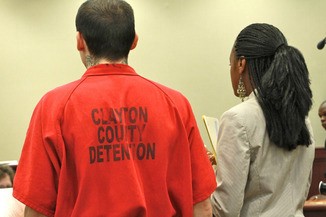Dawn
Porter is the founder of Trilogy Films and the director/producer of Gideon’s Army, which premiered at the 2013 Sundance Film Festival and aired on HBO. Before becoming a filmmaker, she was the
Director of News Standards and Practices at ABC News and Vice President of
Standards and Practices at A&E Networks. Dawn is a graduate of Swarthmore
College and the Georgetown University Law Center. She was a practicing attorney
at Baker & Hostetler and ABC Television Networks before beginning her
television career. [Gideon’s Army website]
Gideon’s Army was
featured at DOC NYC on November 13th and is available on HBO Go.
Women and
Hollywood: Please give us your description of the film playing.
Dawn
Porter: Gideon’s Army is a feature-length documentary about three young, highly
motivated and talented lawyers who work as public defenders, or lawyers who defend
poor people accused of crimes. The film follows their emotional and
professional journeys and their efforts to provide a good defense.
WaH:
What drew you to this story?
DP: I was a lawyer but never a public defender, and I frankly
could not understand why anyone would want to do that job. In 2009 I met
Jonathan Rapping and he invited me to his legal training program for new public
defenders in Birmingham, Alabama. I began following young lawyers in his
program. What I saw during filming truly horrified me: innocent people in
prison for months or years pleading guilty to get out of jail; onerous
sentences for minor crimes; people losing their civil rights, like the right to vote, as a result of criminal convictions. I also saw what a difference it made to
have great lawyers. At first, I was more focused on capturing their stories,
then on the idea of a feature film. I just wanted to show what they were
seeing.
WaH: What was
the biggest challenge in making the film?
DP: There are very few cases that go to trial and we really
wanted to show a case through to a trial by jury. We lucked out in finding not
only a great trial, but also great characters in Demontes and his mother.
It was also challenging to get access to prisons and to the
courtrooms, but I’m pretty stubborn.
WaH: What
advice do you have for other female directors?
DP: Don’t give away your power. Work with great people and let
them do their jobs. Don’t micromanage — that’s not power, that’s just awful. But
always remember: you have a vision and you may have to shout to have it be heard, but it’s worth shouting about.
WaH: Whats the
biggest misconception about you and your work?
DP: That I woke up one day in my law firm and decided to make a
movie. I worked for ABC News for more than six years reviewing scripts and
watching rough and final cuts of news pieces of all lengths, and then did a
similar job at A&E for five years. Over time, I really learned about effective
storytelling and I had a particular interest in letting the characters tell
their story.
WaH: Do you
have any thoughts on what are the biggest challenges and/or opportunities for
the future with the changing distribution mechanisms for films?
DP: One of the things that has been so tough for me to watch is
the decline of support for old-fashioned reporting. Documentary is not news,
but increasingly, we filmmakers are the ones taking a long look at topics. And the
networks and traditional media are embracing that. CNN now has a documentary
film division, as does Time and Al Jazeera America. They are all interested in
our work, which is good for people with a story to tell.
WaH: Name your
favorite women directed film and why.
DP: Middle
of Nowhere by the awesome Ava
Duvernay and Kathryn Bigelow’s Hurt Locker, which is just a spectacularly paced and
tightly driven thriller where she gets to blow stuff up. I’d like to blow stuff
up.
Watch the trailer for Gideon’s Army:







